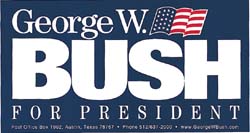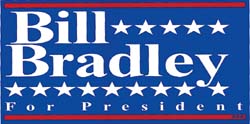 |
 |
| current issue |  |
past issues |  |
send a letter/news |  |
address update |  |
advertise |  |
about us |  |
alumni home |
Short Features
Opinion DominionThe Survey Center tracks what we think
by Tracy Manforte '92
 Forty-five UNH students, including Jackie Ferreer '02, above, work as part-time pollsters at the UNH survey center.
Forty-five UNH students, including Jackie Ferreer '02, above, work as part-time pollsters at the UNH survey center.
|
Question: "Think ahead to the presidential election in November. Suppose it were being held today and the candidates were George W. Bush, the Republican, and Al Gore, the Democrat. Which would you like to see win?"
UNH sophomore Nancy Perkins poses the question to an elderly woman on the other end of the phone line. It sparks a reminiscence about the "good old 1920s" when politicians were honest, but Perkins resists being sidetracked. She has a four-hour shift at the UNH Survey Center ahead of her, and she is determined to keep the interview moving.

|
The 24-cubicle "nerve center" in the basement of Thompson Hall is buzzing with political banter and the tap of computer keys as New Hampshire public opinion is recorded. It's an atmosphere of controlled chaos, with interview questions echoing throughout the room. Perkins and the other callers will telephone up to 7,200 people over two weeks to get the 700 responses they need. Just for fun, center director Andrew Smith has included a few whimsical questions, and students are asking people about Y2K plans and whether they expect a white Christmas, as well as more serious questions about health care, gun control, Social Security and education.
The center, which operates as part of the university's Institute for Policy and Social Science Research, conducts 15 to 20 surveys a year. Besides political surveys, the center conducts public opinion research for nonprofit groups.
The next time she asks the question about the presidential election, Perkins will rotate the names of the candidates to avoid the "recency effect," which Smith defines as a tendency to answer a question with the last choice given. "We have to remain as neutral as possible," Smith explains. "Reading questions exactly as they're phrased and rotating response choices are a couple of ways to avoid skewed results."

|
Tracking the pulse of public opinion is serious business, especially during New Hampshire's first-in-the-nation presidential primary season, which begins nearly a year before the actual vote. Across the country, media and voters rely on New Hampshire to narrow the field of the serious contenders.
Since last spring, Smith has fielded countless media inquiries from national outlets, like The New York Times and CNN. International journalists have also shown an interest in his expertise, which is built on 12 years as a political analyst and pollster. So what has he learned over time?
"Candidates will try to spin polls any way they can," he says. "If they do well, they'll use it to their advantage. If they have a poor showing, they might attack the poll's accuracy or dismiss it and say, 'The only poll that matters is the one on election day.'"

|
A good showing early in the campaign can mean more financial support, Smith says, adding that people are more willing to back a potential winner. Much is at stake, including the reputation of Smith, who hires some 45 UNH students to gather data via telephone.
After wrapping up her interview with the elderly woman, Perkins reflects on their exchange. "Sometimes you can tell you're the first person to ask them what they think. And let me tell you, they will talk," she says. Trying to keep pace, Perkins returns to the phone, but this time is mistaken for a telemarketer. The potential interviewee declines to participate. "We purposely don't use auto-dial," explains field director Martha Belanger, "because that creates a two-second pause and people associate that pause with telemarketers, so they're more likely to hang up." Supervisors can monitor conversations during polling, keeping a running tally of successful calls, how long each call lasts and the number of calls made per hour.
The center wasn't always as technologically advanced. David Moore, now a vice president and managing editor with Gallup Polls, ran the UNH operation from the mid-1970s to 1992. He remembers borrowing eight phones from various departments to conduct a primary poll in 1976 with the help of students and the late Robert Craig, a political science professor.

|
In the 1980s, Moore recalls, "We had the 'luxury' of 12 to 15 phone lines and a central location in Horton Social Science Center. We would run extensions and rig the wires from each faculty member's phone through the ceiling."
Moore remembers practically begging for local coverage when he boldly predicted a landslide win for Gov. Meldrim Thomson Jr. in 1976. "No one would listen because we were so new," he says. Finally, the Portsmouth Herald agreed to print their projections, and a survey center was born.
Today, the survey center is a national player, and its poll results are broadcast across the country within hours of release. "It's really empowering to see the results of your work on CNN," Perkins says. "My parents always ask me, 'What's the next poll going to be on?' and 'What are people saying?' They feel like they have an inside source, and I feel like I'm becoming part of history."
Moore agrees there is no better way for students to learn campaign strategy and grassroots politics. "The results they're generating and reporting have a national impact," he says. "It brings the presidential election to the students in a very direct way."

|
"We have very little to judge these candidates on," Smith reflects. "Really, when you think about it, how well do we know these people?" The public image of a candidate is shaped by what the media and campaigns release, with a few authorized biographies and opinion polls thrown in the mix.
Lack of substance means voters will rely on more shallow criteria when choosing a candidate, like height (taller is better) and a sense of humor. They might even be influenced by how well a candidate is doing in the polls. That's a mistake, Smith believes. Polls are only samples of public opinion: they can tell you how people feel about a particular candidate on a given day, but they don't guarantee that's the way people will vote. Still, people do pay attention. "If public opinion didn't matter, we'd be out of business," Smith says. "And right now, business is very good."
So good, in fact, that it has also affected some student attitudes toward voting. Perkins has learned her opinion does matter, and she says she will definitely vote in her first presidential election this November.
Easy to print version
blog comments powered by Disqus

